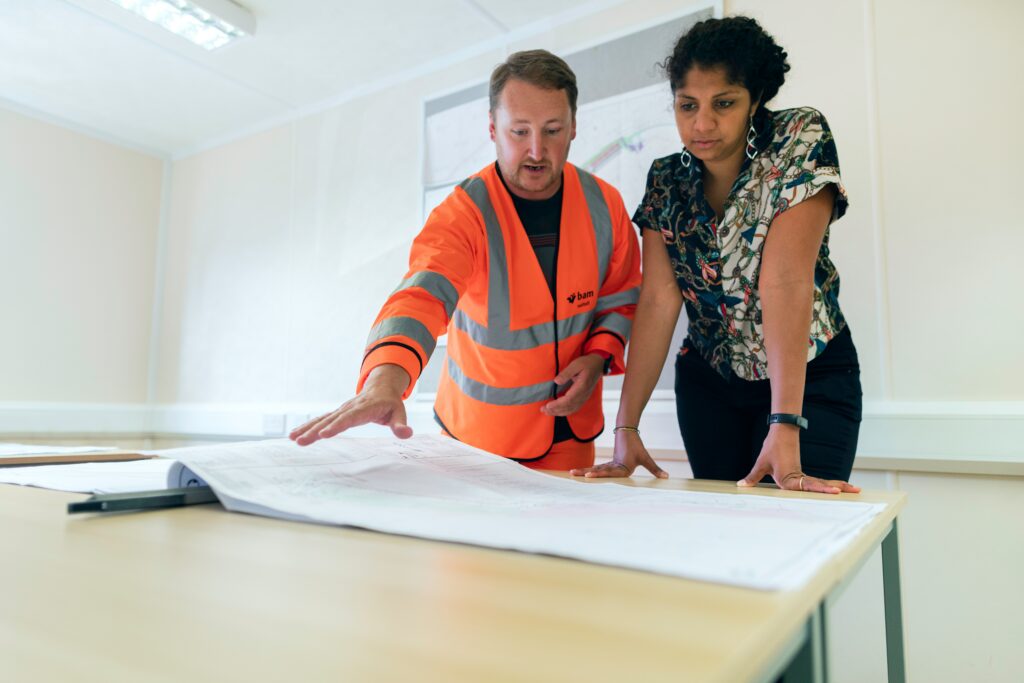
Are you looking to break into a career in construction management? Becoming a construction manager is a lucrative career choice for those ready to take the next step in their career. With relevant experience and a formal qualification, a construction manager role could be the perfect choice for you.
Learn how to become a construction manager with this step-by-step guide.
What is a construction manager?
It is essential to first have an understanding of the role of a construction manager and the responsibilities that come with it. Construction managers work to manage the planning, budgeting, and job scheduling that goes into constructing a building or other construction project.
What does a construction manager do?
Construction managers must apply their expertise in construction-related areas. Your day-to-day may look different depending on the projects you are working on.
Here are some tasks you may perform:
- Schedule, collaborate, and communicate to ensure projects run smoothly and efficiently
- Work closely with subcontractors on-site
- Manage risks of construction-related activities
- Provide strong leadership while making sound decisions on behalf of the project
- Check in with the teams you are responsible for to ensure they have everything they need to complete their jobs
- Keep the project running to schedule
- Meet with community leaders, shareholders and other management professionals to address concerns
- Ensure everyone has the tools they need
- Monitor the availability and status of materials and resources
- Understand the different responsibilities involved in construction management
How much does a construction manager make?
A construction manager’s salary is one of the highest in the building and construction industry. One of the many reasons to upskill into a construction manager role is the lucrative salary increase. In Australia, the average salary range for a construction manager is $100,000–$194,000 a year.
Skills and requirements for a construction manager
To become a successful construction manager, it is essential to understand the job’s requirements. Most places require that you have at least five years of experience in construction or a related field. You should be well-versed in safety procedures, risk assessment techniques, building codes, cost-estimating practices, and principles of design.
Construction management requires a deep understanding of the construction process, including safety protocols, regulations, codes, blueprints, and plans. Having a good knowledge of the materials and equipment used in construction is necessary for the safe and efficient execution of projects, as well as familiarity with WHS.
As a construction manager, it’s important to have excellent communication, problem-solving, and interpersonal skills. Soft skills can be learned through courses, on-the-job training, and informal experience. These skills will help you deal with people tactfully and collaborate effectively with co-workers. Additionally, having good soft skills is essential to ensure you successfully complete your projects on time and within budget guidelines.
Download our FREE 'Your Career in Building and Construction Management' Guide
Find the latest information in our eBook about a career in construction management, including current job opportunities, skills you need, salary information and more.
Is construction management hard?
Construction management requires dedication and work to build your skills and experience. However, with a diploma qualification, a few years of on-site experience and some patience, it’s very achievable. Stick to your goal and you can be working as a construction manager with the six figure salary to match.
What qualifications do I need to become a construction manager?
Most employers prefer that job candidates for construction manager positions possess a diploma in construction management, civil engineering, building science, or a related field. Diploma qualifications typically provide comprehensive education on the principles and methods of construction theory and practices, as well as hands-on experience with relevant tools and software programs.
A construction management online course can propel your career forward. The Diploma of Building & Construction (Management) (CPC50320) will teach you the fundamental skills needed to excel as a construction manager. You’ll learn how to liaise with stakeholders, as well as develop your WHS and risk management capabilities.
The benefit of studying a construction management diploma online is that you can enjoy self-paced, flexible study while gaining a nationally recognised qualification. You can also continue to work and gain experience in construction management, building your hands-on skills while you develop expertise only learned through formal qualifications.
Does a construction manager need a licence?
Construction managers don’t need a licence, however, most construction managers start by directly working on a construction site. Most will have a white card and some also have a builder’s licence depending on their previous experience.
Is construction manager a good job?
The construction industry is constantly growing and withstanding economic and societal stresses, making it a strong industry to upskill into. According to National Industry Insights, it generates over $360 billion in revenue in Australia, accounting for 9% of our GDP. This makes it a secure career choice for those looking at their long-term goals. Additionally, with a 10.2% job growth by 2026, becoming a construction manager is a sensible choice for your long-term career.
Small and medium-sized businesses make up the majority of businesses in the construction industry. This benefits those looking for contract administrator jobs, as many of these can be found in small construction businesses.
With a Diploma of Building & Construction (Management) (CPC50320), you’ll be prepared to go straight into a construction management position, with the ability to learn a wide range of skills crucial to overseeing high-level construction projects.
Discover your career in construction management
Explore courses designed to help you elevate your career!
Prepare for a construction management career, with the ability to learn a wide range of skills crucial to overseeing high-level construction projects.
View courses





